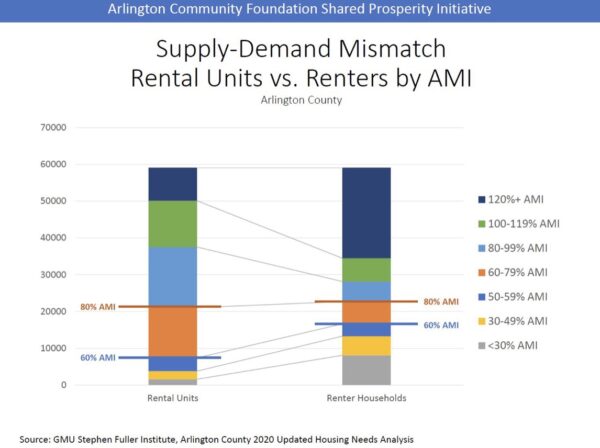Peter’s Take is a biweekly opinion column. The views expressed are solely the author’s.
Arlington County government should increase substantially the amount of Arlington taxpayer dollars devoted to providing housing for our lowest income Arlington households — those living on 30% or less of Area Median Income (AMI).
The most fiscally responsible way to fund this increase is first to redirect taxpayer dollars that currently are used to provide housing subsidies for those at the highest AMI levels.
Arlington housing trends by income levels

The supply of rental units available to those households living on 30% or less of AMI, or $37,800 for a family of four in 2020, was far outstripped by the number of households seeking such units. (Updated data show that 2021 AMI in Arlington is now $129,000.)
The 2020 Housing Needs Analysis established that from 2012 to 2018, there was a significant decline in the number of these low-income rental households–from 9,067 to 8,077. By contrast, the number of households in the highest income categories (100% of AMI and above) increased from 27,667 to 30,955.
Many members of Arlington’s lowest-income households work multiple jobs such as hospital aides, office cleaners, and construction and food service employees. They play a vital part in our economic success and provide our diverse community fabric.
These residents are all just one emergency away from job loss or eviction. The statistical trends discussed above document the steady displacement of Arlington’s lowest-income households.
We have a moral obligation to assign the highest priority to stabilize these lowest-income families and putting them in the position to contribute to the social and cultural fabric of our community as both residents and employees.
Arlington Community Foundation (ACF), in collaboration with the national Shared Prosperity Partnership, has been a leader in advocating for our community to take bold steps to prevent the involuntary displacement of our lowest-income renters. We should support this ACF initiative with a substantial increase in taxpayer funding.
Strategies to prioritize assistance to lowest-income households
The Arlington County government should pursue these strategies in order substantially to increase taxpayer support to our lowest income households:
- Major increases in the number of County-funded Housing Grants
We should substantially increase the number of local Housing Grants and prioritize serving households with incomes of 30% of AMI and below. With approximately 50% of our lowest-income renters receiving no financial assistance, there is much need AND opportunity. In FY2021, this program served 1358 Arlington low income, low-asset legal households who are:
- 65 years or older and/or
- Totally and permanently disabled and/or
- Working families with at least one child under age 18 and/or
- Clients and patients of a County-operated or County-supported mental health program
More than 40% of those receiving Housing Grants are people with disabilities. More than 30% are elderly low-income residents over 65. Less than 30% are working families who, on average, use this program for 5 years or less.
- Re-examine current criteria for participation in the Housing Grant program
We should re-examine allowable rents, and potentially expand the kinds of households that can receive support. Many working family households fall just below the required number of hours worked to get or keep their housing grants because child care options are lacking or their shift work has variable hours.
Conclusion
This Arlington Cliff Effect video makes a compelling case for substantially increased taxpayer support. In the current fiscal year (FY2022), the County’s Housing Grant budget is $14.2 million. We should meet the Shared Prosperity Partnership’s goal of stably housing 1,500 additional households by calendar year 2025, based on a 50/50 split between government and private philanthropy.
Assuming that the average grant should be $10K due to inflation, this means that the Arlington County government contribution needs to rise by $15 million to add 1,500 households.
The county government should plan now to increase its Housing Grant contribution by $3.75 million per year for each of the next four years. The most fiscally responsible way to fund this increase is first to redirect taxpayer dollars that currently are used to provide housing subsidies for those at the highest AMI levels.
Peter Rousselot previously served as Chair of the Fiscal Affairs Advisory Commission (FAAC) to the Arlington County Board and as Co-Chair of the Advisory Council on Instruction (ACI) to the Arlington School Board. He is also a former Chair of the Arlington County Democratic Committee (ACDC) and a former member of the Central Committee of the Democratic Party of Virginia (DPVA). He currently serves as a board member of the Together Virginia PAC-a political action committee dedicated to identifying, helping and advising Democratic candidates in rural Virginia.


